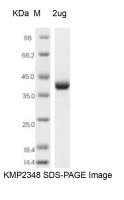Service Line:+86-022-82164980
Address:FL-4, Building A5, International Enterprise Community, Tianjin, China
Email:[email protected]
| Catalog Number | KMP2348 |
|---|---|
| Product Name | Mouse CD276 Protein, His Tag |
| Product Description | The Mouse CD276 Protein(KMP2348) is produced in HEK293 Cells and the target gene encoding Val29-Phe244 is expressed with a 6His tag at the C-terminus. |
| Molecular Weight | 24.32 kDa |
| Alias | CD276 antigen, CD276, B7 homolog 3 |
| Species | Mouse |
| Host | HEK293 Cells |
| Size | 50ug, 100ug, 200ug |
| Purification | Affinity purification |
| Purity | >95% as determined by SDS-PAGE |
| Endotoxin | <1.0 EU/ug determined by the LAL method |
| Buffer | PBS, pH7.4 |
| Uniprot | Q8VE98 |
| SDS-PAGE |  |
| Function | Modulates T-cell-mediated immune responses and the development of acute and chronic transplant rejection. Plays a positive regulatory role in bone formation and has a dual role in the bone-immune interface. Induces antitumor immunity as it activates both acquired and innate immunity leading to natural killer cell and CD8 T-cell dependent killing of tumor cells. |
| Background | CD276, also known as B7-H3, is a member of the B7 superfamily with signature IgV and IgG regions in extracellular domains. It is a type I transmembrane protein and shares 20–27% amino acid identity with other B7 family members. B7-H3 is involved in the activation of T lymphocytes, and regulates murine bone formation. It is also reported that B7-H3 may play an important role in muscle-immune interactions, providing further evidence of the active role of muscle cells in local immunoregulatory processes. B7-H3 is expressed on T-cells, natural killer cells, and antigen presenting cells, as well as some non-immune cells, such as osteoblasts, fibroblasts, fibroblast-like synoviocytes and epithelial cells. High expression of B7-H3 in tumor vasculature also correlates with poor survival in patients, suggesting that it may play a role in tumor cell migration. |
| Storage | Aliquot and store at -20℃ to -80℃. Avoid repeated freezing and thawing cycles. |
| Note | This product is for research use only. |
| References | 1.J. Immunol. 168:6294-6297 (2002) 2.Nat. Immunol. 4:899-906 (2003) 3.Gene Ther. 10:1728-1734 (2003) 4.J. Immunol. 173:2500-2506 (2004) 5.Eur. J. Immunol. 35:428-438 (2005) |